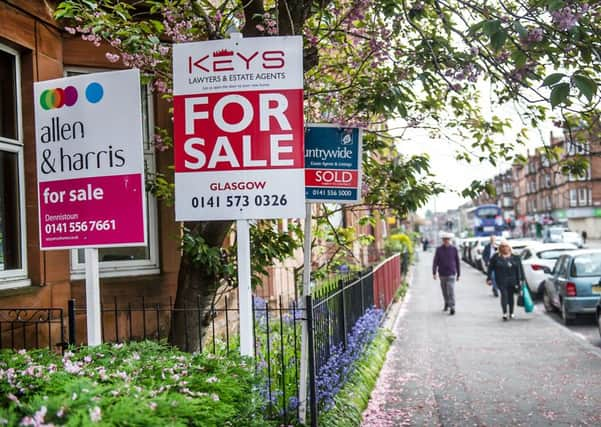Residential market set for quiet patch amid uncertainties
This article contains affiliate links. We may earn a small commission on items purchased through this article, but that does not affect our editorial judgement.


Industry experts predict that while investors are likely to return to the sector in the near future, thanks to strong underlying fundamentals, political upheaval on several fronts will keep market conditions soft for the next 12 months.
House prices are likely to eke out only modest gains over the next two years, with stronger returns forecast from 2019.
Advertisement
Hide AdAdvertisement
Hide AdFigures released earlier this month by Registers of Scotland showed that Scottish house prices grew steadily over the past year, easily outstripping inflation, which is predicted to gather pace in the new year following the slump in sterling. The latest monthly UK House Price Index showed the average price of a property was £143,131 – some 4 per cent higher than a year earlier and 1 per cent up on the previous month.


Last month’s Hometrack index pointed to year-on-year average growth of 3.8 per cent in Edinburgh house prices while Aberdeen, which has been hit badly by the oil sector slump, recorded a fall of more than 6 per cent.
Meanwhile, Scotland continues to face an undersupply of housing which has been a factor in the rise of the private rental sector with the nation’s owner occupation rate dropping by more than 5 percentage points since 2005 to about 60 per cent this year.
Releasing his 2016 review and forecasts for the coming year, John Boyle, director of research and strategy at property adviser Rettie & Co, said: “The developing global financial crisis, punctuated by Brexit Britain and Trump’s New America, has significantly impacted what was always going to be a challenging year in the residential property market.
“When you add in our own Scotland-specific dynamics, including land and buildings transaction tax [LBTT] and tenancy reform, it’s hard to forecast anything other than subdued conditions in 2017.”


Andrew Meehan, senior researcher at the Edinburgh-based firm, added: “What we’re seeing is that there is definitely a problem in the sales market which is down to a lack of stock rather than difficulty in selling, the upside of which is that prices should be protected by continuing undersupply.”
Rettie & Co is anticipating average house price growth to return to between 3 to 4 per cent a year from 2019 and average rents to grow by 2 to 4 per cent per annum.
It comes as the Halifax today predicted that house prices will continue edging upwards across 2017 – but the rate of growth will slow as households see their spending power squeezed.
Advertisement
Hide AdAdvertisement
Hide AdBy the end of 2017, the bank expects annual UK house price growth to be running between 1 per cent and 4 per cent. It said the wide range for its forecast “reflects the higher than normal degree of uncertainty regarding the prospects for the UK economy”.